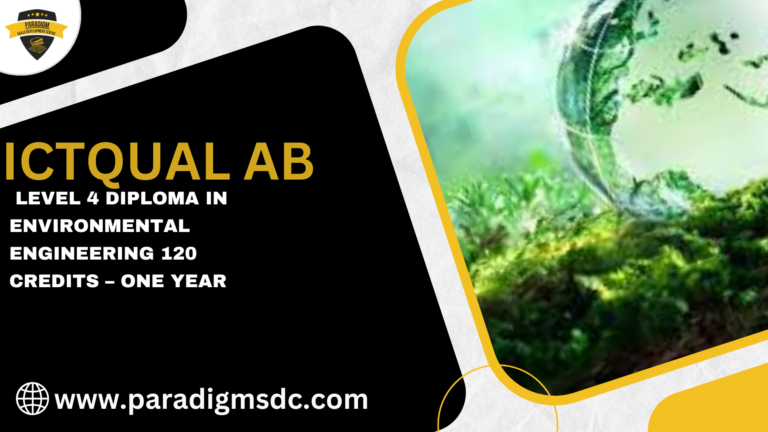In today’s fast-evolving technological landscape, chemical engineering plays a pivotal role in solving global challenges, from producing sustainable energy to developing life-saving pharmaceuticals. If you are eager to explore this dynamic field and make a tangible impact, the ICTQual Level 4 Diploma in Chemical Engineering could be your gateway to success.
The ICTQual Level 4 Diploma in Chemical Engineering is a specialized qualification aimed at providing learners with a solid foundation in chemical engineering concepts and practical applications. Over the course of one year, students will gain in-depth knowledge of chemical processes, thermodynamics, material science, safety protocols, environmental sustainability, and much more.
The course structure is designed to offer both theoretical learning and hands-on practical experiences, ensuring that learners can apply their knowledge in real-world settings. With 120 credits, the course covers a diverse range of topics to prepare students for a successful career in the chemical engineering industry.
Assessment throughout the course is designed to evaluate both theoretical knowledge and practical skills. Students will be required to complete written assignments, exams, project work, and practical assessments. This ensures that they are fully prepared to enter the workforce and excel in chemical engineering roles.
Upon successful completion of the course, learners are awarded the ICTQual Level 4 Diploma in Chemical Engineering. This qualification is recognized by employers and provides an excellent foundation for further study or career progression
Study Units:
- Introduction to Chemical Engineering
- Process Heat Transfer
- Fundamentals of Chemistry for Engineers
- Fluid Mechanics for Chemical Engineers
- Mass Transfer Operations
- Chemical Reaction Engineering
- Materials and Process Selection
- Process Control and Instrumentation
- Environmental Engineering in Chemical Processes
- Chemical Engineering Thermodynamics
- Safety and Risk Management in Chemical Engineering
- Chemical Process Design Project
Learning Outcomes:
Here are the Learning Outcomes for each study unit in the ICTQual Level 4 Diploma in Chemical Engineering (120 Credits – One Year):
1. Introduction to Chemical Engineering (10 Credits)
- Learning Outcomes:
- Demonstrate an understanding of the fundamental principles and concepts in chemical engineering.
- Describe the historical development of chemical engineering and its application across various industries.
- Identify the core areas of chemical engineering such as process design, material handling, and system integration.
- Discuss the role of chemical engineers in industrial settings, addressing sustainability and ethical considerations in engineering practices.
2. Process Heat Transfer (10 Credits)
- Learning Outcomes:
- Explain the basic mechanisms of heat transfer, including conduction, convection, and radiation.
- Apply the principles of heat transfer to chemical process equipment such as heat exchangers and boilers.
- Calculate heat transfer rates and select appropriate materials for different thermal environments.
- Analyze energy balance in thermal processes and understand the impact of heat transfer on process efficiency.
3. Fundamentals of Chemistry for Engineers (10 Credits)
- Learning Outcomes:
- Apply basic principles of chemistry, including stoichiometry and thermodynamics, to chemical engineering problems.
- Demonstrate an understanding of atomic structure, bonding, and molecular interactions relevant to engineering materials.
- Explain how chemical reactions are driven by thermodynamic principles and kinetics.
- Solve problems involving chemical equations, reaction rates, and material balances.
4. Fluid Mechanics for Chemical Engineers (10 Credits)
- Learning Outcomes:
- Define key fluid properties and their significance in chemical processes.
- Analyze fluid flow using principles such as Bernoulli’s equation and the continuity equation.
- Design and calculate flow systems, including pumps and piping, for industrial applications.
- Evaluate the effects of viscosity, pressure, and temperature on fluid dynamics in different process environments.
5. Mass Transfer Operations (10 Credits)
- Learning Outcomes:
- Explain the principles of mass transfer, including diffusion, convective mass transfer, and mass transfer coefficients.
- Design separation processes such as distillation, filtration, and absorption based on mass transfer principles.
- Apply mathematical models to predict and optimize mass transfer in industrial processes.
- Analyze and select suitable separation technologies based on material properties and process conditions.
6. Chemical Reaction Engineering (10 Credits)
- Learning Outcomes:
- Understand the fundamental concepts of chemical reaction kinetics and rate laws.
- Analyze and design chemical reactors (batch, continuous) to optimize reaction performance.
- Apply the principles of catalysis and enzyme activity in industrial processes.
- Perform mass and energy balance calculations to size reactors and predict reactor behavior.
7. Materials and Process Selection (10 Credits)
- Learning Outcomes:
- Identify and compare different materials used in chemical engineering processes based on their physical and chemical properties.
- Select appropriate materials for process equipment design, considering factors such as corrosion, wear, and thermal stress.
- Apply principles of sustainability to process and material selection to reduce environmental impact.
- Evaluate the cost-effectiveness and performance of materials for specific applications.
8. Process Control and Instrumentation (10 Credits)
- Learning Outcomes:
- Describe the role of process control and instrumentation in chemical engineering.
- Understand control loop dynamics, including feedback, feedforward, and PID controllers.
- Interpret instrumentation diagrams and understand the principles behind sensors, actuators, and control systems.
- Apply process control principles to improve the efficiency and safety of chemical processes.
9. Environmental Engineering in Chemical Processes (10 Credits)
- Learning Outcomes:
- Explain the environmental impact of chemical processes and the role of chemical engineers in reducing pollution.
- Analyze the principles and technologies for wastewater treatment, air pollution control, and waste management.
- Implement strategies for sustainable resource management in chemical manufacturing.
- Interpret environmental regulations and guidelines that govern industrial operations.
10. Chemical Engineering Thermodynamics (10 Credits)
- Learning Outcomes:
- Apply the laws of thermodynamics to analyze energy systems in chemical processes.
- Understand phase equilibria and chemical equilibria in multi-component systems.
- Calculate thermodynamic properties of substances and apply these to industrial chemical reactions.
- Solve problems involving energy conservation, entropy, and enthalpy changes in chemical processes.
11. Safety and Risk Management in Chemical Engineering (10 Credits)
- Learning Outcomes:
- Identify and assess the risks associated with chemical engineering processes.
- Apply safety standards and regulations to minimize accidents and ensure safe operation in chemical plants.
- Perform risk analysis and hazard identification using tools like HAZOP and FMEA.
- Develop emergency response plans and understand the importance of safety audits and compliance.
12. Chemical Process Design Project (10 Credits)
- Learning Outcomes:
- Design a chemical process using principles of material and energy balances, thermodynamics, and reaction engineering.
- Develop process flow diagrams (PFDs) and piping and instrumentation diagrams (P&IDs).
- Evaluate the economic, environmental, and safety aspects of the proposed process design.
- Present and defend the design decisions and outcomes in a professional project report and presentation.
These learning outcomes ensure that students acquire both the theoretical knowledge and practical skills necessary to become successful chemical engineers. Each study unit builds upon the previous, allowing students to develop a well-rounded skill set in chemical engineering that will serve them in their future careers.







